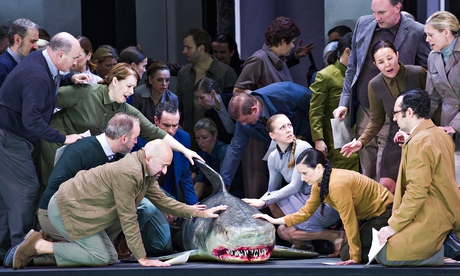
To start at the end, Mozart’s Idomeneo concludes with a ballet, sometimes omitted but containing exuberant, urgent music which quickens the pulse and dumbfounds the senses. It provided a powerful finale, expertly choreographed but without a step of dance, to the Royal Opera’s new staging of Mozart’s first mature masterpiece. In those closing moments last Monday evening, much fell into place, not a minute too soon.
Marc Minkowski, conducting, found the taut, energetic form which had too often eluded him, now rapid, now sluggish, in the preceding four hours. The set, a stark revolve which folded in and out and resembled an unfinished Greek hotel, came into its own, turning slowly to allow several nimbly executed transformations. Children, pristine in white, petrify into cobwebby, silvered age. The Greek-Trojan lovers Idamante and Ilia, united in uneasy marriage, appear more blood-spattered at each slow spin. The old tyrannies gone, a new era is ushered in with all its hopes and anxieties. The message is clear.
Then the curtain fell and the boos rose, loud, low bellows, insolent, rude and dismissive. They were reserved for director Martin Kušej and his Austro-German production team, making their UK debut. Was this the famous if peculiar British reserve, they must have wondered as they took a hasty bow. Director’s opera, or regietheater, is sometimes only graspable after the event – if at all, some might say. Having been baffled and irritated during the performance, the imagery and insights, and the music above all, are still hanging around in my head and won’t leave. Something was right.
Kušej, to whose name “edgy” sticks like a burr, has featured Abu Ghraib and Josef Fritzl’s incarcerated children in previous productions. His work has been seen internationally, especially in Munich, but never here before. There was no chance that this Idomeneo would reside in a world of gods and sea monsters. Kušej instead provides a floppy shark dribbling blood, and some hand-held fish for the chorus to waggle.
Despite this, Kušej’s overarching aim could scarcely be more serious. The hints were there, plain and bald, in the programme: photos of the Vietnam war, hurricanes Katrina and Sandy, general devastation provoked by mankind’s greed. Idomeneo, the ruthless king of Crete, is seen hiding behind the useful excuse of fate. Saved from a shipwreck, he must sacrifice the first person he meets. When that person turns out to be his son, ruling with liberal generosity in his father’s absence, motives curdle, expediency and love become bloodily entangled.
Mozart wrote Idomeneo in 1780 when he was in his early 20s. He took inspiration from Gluck’s opera reforms: in short, more ensembles and choruses, greater continuity and flow. The result was some of Mozart’s most majestic operatic music, with a spectacular Act 3 quartet, tremendous choruses and unusual orchestral writing, especially for woodwind and horns. Mozart was always a friend to those instruments; think of his clarinet concerto and quintet, or his horn concertos. The late Charles Mackerras was a particular advocate of Idomeneo. He helped many of us to revere it. Minkowski was not as convincing, but conjured spirited, vivid playing from the ROH orchestra. If the tempos settle down, all will be well.
The singing was mostly excellent. Sophie Bevan, as the Trojan princess Ilia, dominates the opera’s opening and then hardly appears again. Her words were notably clear (not always the case elsewhere), emotions potently expressed, voice warm and pliant. The Swedish soprano Malin Byström, in black with sexy red gloves and shiny black heels, delivered Elettra’s vengeful arias with magnetic force. Thwarted in her love for Idamante and defender of the old regime, she shares the D minor key in which Don Giovanni is dragged to hell in a later opera. Mozart is always precise in his choice of keys: nothing happens by chance.
American tenor Matthew Polenzani negotiated the morally perilous title role with elegance. Idamante, usually a mezzo or tenor, was sung by the Argentinian countertenor Franco Fagioli, who sounded somewhat restricted and warbly. Stanislas de Barbeyrac made an exciting ROH debut as Arbace, even if he did have to carry an accordion and wear broken glasses à la Jack Duckworth.
To mark the centenary of the first world war the London Symphony Orchestra, under the impressive Gianandrea Noseda – last week named conductor of the year 2015 by Musical America – gave the world premiere of Equal Voices, an elegiac cantata by Sally Beamish with texts by Andrew Motion. His poem is about shell shock, entwined with words from the Song of Solomon. Beamish’s response is ambitious and moving.
The choruses, terrifically delivered by the London Symphony Chorus, range from hymn-like to snarling. If the work continues the musical line stretching from Elgar’s Gerontius to Britten’s War Requiem, no one should complain. This co-commission with the Royal Scottish National Orchestra would have worked even better had it been performed alone, or in the first half when our energies were fresh. At 50 minutes it demands concentration and re-listening. Luckily you can hear it as many times as you like on iPlayer until 1 December.
Star ratings (out of 5)
Idomeneo ***
Equal Voices ****

